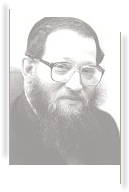
From a Shiur by Rebbetzin Heller
"To Worry or Not to Worry"
from Aish MP3
Rambam says that no one knows what is going to come in with the new day. We would all like to think that our lives will be without challenges and without difficulties. Our live can be lives of Simcha, but nobody has a life without difficulty. So how do we know what will happen when difficulties happen? What determines this is our relationship to the past and the present. You can not get out of your past by yourself. You have to ask Hashem to Help you.
We have to worry if our choices are right. If we make decisions without thinking them through very carefully we are liable to make a mistake.
Another worry that we have to have is are we the person that we are supposed to be. Did we use the potential that Hashem gave us.
Another worry that we have to have is did we cause quarrelling. The reason that we are tempted to start quarrels is our desire for truth. The way to do this is to respect the person if you do not agree with the persons opinion.
The ultimate way of losing our self is to focus on taking not giving. Something like taking a pen from work is worse then stealing something major because we will never do Teshuvah.
The first step in seeing goodness and wholeness is to at least not belittle.
When we confront bad we have to use it to reflect on how to become better and what message is this sending me. Then we have to personalize it.
All of our worries can be contained in one, Golus Haschichnah. The more that our hearts are involved in this worry the less we worry about the rest. We have to be open to wherever Hashem takes us because we never know what is going to help us bring out the best in ourselves. We have to be open to all opportunities.
Lets say you are having a lecture in a half an hour and the chairs did not come. You are beside yourself with worry. Now lets say that there is someone else who is responsible for the chairs, Evelyn. Its not your problem its Evelyn. Make Hashem your Evelyn for all of your problems. They are not your problems, they are Hashem's problem.
One of my biggest fears now is losing my abstinence. Like many others I dream about it all the time. This is a powerful tool for facing that fear, and many others.






















































